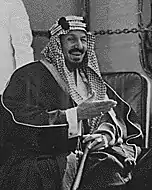Fawwaz bin Abdulaziz
Fawwaz bin Abdulaziz Al Saud (or Fawaz; 1934 – 19 July 2008) (Arabic: فواز بن عبد العزيز آل سعود) was a senior member of the House of Saud. In 2006, Fawwaz became one of the members of the Allegiance Commission. However, he died on 19 July 2008, some six months after the establishment of the council.
| Fawwaz bin Abdulaziz | |||||
|---|---|---|---|---|---|
| Governor of Makkah Province | |||||
| in office | 1971–1980 | ||||
| Predecessor | Mishaal bin Abdulaziz | ||||
| Successor | Majid bin Abdulaziz | ||||
| Monarch | King Faisal King Khalid | ||||
| Governor of Riyadh Province | |||||
| in office | 1960–1961 | ||||
| Predecessor | Salman bin Abdulaziz | ||||
| Successor | Badr bin Saud bin Abdulaziz | ||||
| Monarch | King Saud | ||||
| Born | 1934 Taif | ||||
| Died | 19 July 2008 (aged 73-74) Paris | ||||
| Burial | 20 July 2008 | ||||
| Spouse | Fawzia bint Hussain Izzat | ||||
| |||||
| House | House of Saud | ||||
| Father | Ibn Saud | ||||
| Mother | Bazza II | ||||
Early life and education
Prince Fawwaz was born in Taif in 1934.[1][2] He was the son of Ibn Saud and Bazza II (died 1940), a Circassian woman born in Syria.[3][4][5] Fawwaz was the 24th son of Ibn Saud.[2] His only full brother was Prince Bandar bin Abdulaziz.[6][7]
He received his early education at the Princes' School in Riyadh.[2]
Career
Prince Fawwaz was governor of Riyadh from 1960 to 1961.[8] On 18 June 1969, he was appointed deputy governor of Makkah Province.[6] Then, he served as governor of the province from 1971 to 1980.[1][9] He was the governor when the Grand Mosque Seizure occurred.[10][11] After this event, he was removed from office for corruption allegations by the group seized the mosque.[11][12][13] There is another report arguing that following the incident Prince Fawwaz resigned from the office citing health problems.[14]
Free princes movement
Fawwaz bin Abdulaziz together with Prince Talal and Prince Badr was a member of the Free Princes Movement from 1962 to February 1964.[5][6]
Personal life
Prince Fawwaz was married to Fawzia bint Hussain Izzat.[6][15] He had only an adopted son who could not replace him in the Allegiance Council. He had a wide range of business activities related to property development in the kingdom.
Fawwaz bin Abdulaziz was one of the royal family members who was harshly criticised by Juhayman al Otaybi and Abdullah Al Qahtani, leaders of the group seized Grand Mosque in 1979, for his unabashed drinking, gambling, and corruption.[12][13]
Death
Fawwaz bin Abdulaziz died in Paris on 19 July 2008, at the age of 74, after suffering from a disease.[16][17] His funeral was held in the Grand Mosque in Mecca on 20 July 2008. His body was buried in Al Adl cemetery in Mecca.[2] Condolence messages were sent to King Abdullah, the Saudi government and the Saudi Royal Family from Hamad ibn Isa Al Khalifah,[18] Sabah Al-Ahmad Al-Jaber Al-Sabah,[19] and Sheikh Hamad bin Khalifa and Sheikh Tamim Bin Hamad Al Thani.[20]
Ancestry
| Ancestors of Fawwaz bin Abdulaziz | |||||||||||||||||||||||||||||||||||||||||||||||||||||||||||||||||||||||||||||||||||||||||||||||||||||||||||||||||||||||||||||||||||||||||||||||||||||||||||||||||||||||||||||||||||||||||||||||||||||||||||||||||||||||||||||||||||||||||||||||||||||||||||||||||||||||||||||||||||||||||||||||||||||||||||||||||||||||||||||||||||||||||||||||||||||||||||||||||||||||||||||||||||||||||||||||||||||||||||||||||||||||||||||||||||||||||||||||||||||||||||||||||||||||||||||||||||
|---|---|---|---|---|---|---|---|---|---|---|---|---|---|---|---|---|---|---|---|---|---|---|---|---|---|---|---|---|---|---|---|---|---|---|---|---|---|---|---|---|---|---|---|---|---|---|---|---|---|---|---|---|---|---|---|---|---|---|---|---|---|---|---|---|---|---|---|---|---|---|---|---|---|---|---|---|---|---|---|---|---|---|---|---|---|---|---|---|---|---|---|---|---|---|---|---|---|---|---|---|---|---|---|---|---|---|---|---|---|---|---|---|---|---|---|---|---|---|---|---|---|---|---|---|---|---|---|---|---|---|---|---|---|---|---|---|---|---|---|---|---|---|---|---|---|---|---|---|---|---|---|---|---|---|---|---|---|---|---|---|---|---|---|---|---|---|---|---|---|---|---|---|---|---|---|---|---|---|---|---|---|---|---|---|---|---|---|---|---|---|---|---|---|---|---|---|---|---|---|---|---|---|---|---|---|---|---|---|---|---|---|---|---|---|---|---|---|---|---|---|---|---|---|---|---|---|---|---|---|---|---|---|---|---|---|---|---|---|---|---|---|---|---|---|---|---|---|---|---|---|---|---|---|---|---|---|---|---|---|---|---|---|---|---|---|---|---|---|---|---|---|---|---|---|---|---|---|---|---|---|---|---|---|---|---|---|---|---|---|---|---|---|---|---|---|---|---|---|---|---|---|---|---|---|---|---|---|---|---|---|---|---|---|---|---|---|---|---|---|---|---|---|---|---|---|---|---|---|---|---|---|---|---|---|---|---|---|---|---|---|---|---|---|---|---|---|---|---|---|---|---|---|---|---|---|---|---|---|---|---|---|---|---|---|---|---|---|---|---|---|---|---|---|---|---|---|---|---|---|---|---|---|---|---|---|---|---|---|---|---|---|---|---|---|---|---|---|---|---|---|---|---|---|---|---|---|---|---|---|---|---|---|---|---|---|---|---|---|---|---|---|---|---|---|---|---|---|---|---|---|---|---|---|---|---|---|---|---|---|---|---|---|---|---|---|---|---|---|---|---|---|---|---|---|---|---|---|---|---|---|---|---|---|---|---|---|---|
| |||||||||||||||||||||||||||||||||||||||||||||||||||||||||||||||||||||||||||||||||||||||||||||||||||||||||||||||||||||||||||||||||||||||||||||||||||||||||||||||||||||||||||||||||||||||||||||||||||||||||||||||||||||||||||||||||||||||||||||||||||||||||||||||||||||||||||||||||||||||||||||||||||||||||||||||||||||||||||||||||||||||||||||||||||||||||||||||||||||||||||||||||||||||||||||||||||||||||||||||||||||||||||||||||||||||||||||||||||||||||||||||||||||||||||||||||||
References
- "His Royal Highness Prince Fawaz bin Abdulaziz". Ministry of Interior. 2013. Archived from the original on 25 September 2013. Retrieved 1 March 2019.
- "Saudi royal court mourns Prince Fawaz bin Abdulaziz". Ain al Yaqeen. 29 July 2008. Archived from the original on 27 September 2013. Retrieved 4 May 2012.
- "Biography of Bazzah". Datarabia. Retrieved 10 August 2012.
- Winberg Chai (22 September 2005). Saudi Arabia: A Modern Reader. University of Indianapolis Press. p. 193. ISBN 978-0-88093-859-4.
- Simon Henderson (1995). After King Fahd: Succession in Saudi Arabia (PDF). Policy Papers (2nd ed.). Washington, D.C.: The Washington Institute for Near East Policy. ISBN 9780944029558. LCCN 94012154. OCLC 476709498.
- Sharaf Sabri (2001). The House of Saud in Commerce: A Study of Royal Entrepreneurship in Saudi Arabia. New Delhi: I.S. Publications. pp. 137–138. ISBN 978-81-901254-0-6. OCLC 924353889.
- "Appendix 6. The Sons of Abdulaziz" (PDF). Springer. Retrieved 13 August 2020.
- Yitzhak Oron, ed. (1961). Middle East Record. 2. Israel: Israel Program for Scientific Translations for Tel Aviv University. p. 420.
- Ghassane Salameh; Vivian Steir (October 1980). "Political Power and the Saudi State". MERIP (91): 5–22. doi:10.2307/3010946. ISSN 0047-7265. JSTOR 3010946. OCLC 5548706854.
- Joseph A. Kechichian (February 1986). "The Role of the Ulama in the Politics of an Islamic State: The Case of Saudi Arabia". International Journal of Middle East Studies. 18 (1): 53–71. doi:10.1017/s002074380003021x. ISSN 0020-7438. JSTOR 162860. OCLC 4815045431.
- Peter W. Wilson (20 July 1994). Saudi Arabia: The Coming Storm. M.E. Sharpe. p. 59. ISBN 978-0-7656-3347-7.
- Baron V. Reinhold (June 2001). "Omnibalancing and the House of Saud" (PDF). Naval Postgraduate School. Monterey, CA. OCLC 640954800. Retrieved 13 May 2012.
- Geoffrey F. Gresh; Tugrul Keskin (17 April 2018). US Foreign Policy in the Middle East: From American Missionaries to the Islamic State. Taylor & Francis. p. 1999. ISBN 978-1-351-16962-2.
- Nadav Safran (1988). "4. The Reign of Khaled, 1975–1982". Saudi Arabia: The Ceaseless Quest for Security. Cornell University Press. p. 446.
- "Family Tree of Fawwaz bin Abdulaziz bin Abdul Rahman Al Saud". Datarabia. Retrieved 4 May 2012.
- "Prince Fawaz bin Abdulaziz passes away". Saudi Press Agency. 22 July 2008. Retrieved 2 September 2008.
- Joseph A. Kéchichian (2013). Legal and Political Reforms in Sa'udi Arabia. Routledge. p. 139. ISBN 978-0-203-08120-4. OCLC 1058645598.
- "Bahraini Leadership Condole Saudi Arabia". Bahrain News Agency. 24 July 2008. Retrieved 1 March 2019.
- "Kuwait Amir sends cable of condolences to Saudi King". Kuwait News Agency. 22 July 2008. Retrieved 3 September 2008.
- "Qatar Premier condoles the Saudi Monarch". Qatar Ministry of Foreign Affairs. 23 July 2008. Archived from the original on 26 July 2012. Retrieved 26 May 2012.

